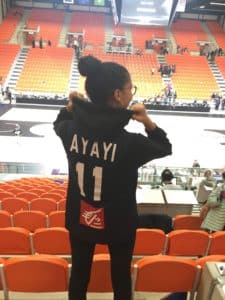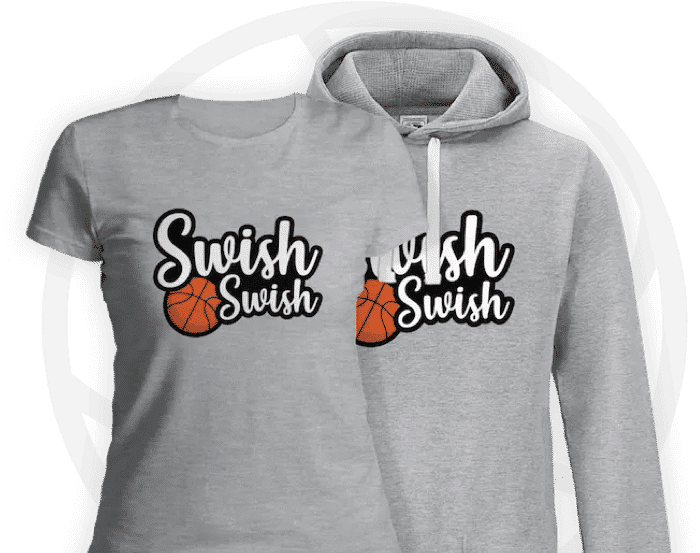It’s not everyday that you get to talk to a player whose journey is as interesting and unusual as Sami Whitcomb’s, the player who once had to give up on the idea of playing professional basketball… only to find herself holding the WNBA trophy a few years later.
Sami was kind enough to talk to us about her unique, remarkable journey.
Swish Swish is a french speaking site but we like to share some of our interviews in English. They can be found here.
Sami, how are you, and have you been able to go back to some sort of normalcy after this very weird end of season for you in France ?
I’m fine, I’m still really disappointed that we didn’t get a chance to complete the season, as I’m sure most athletes are, but obviously, I understand the severity of coronavirus and how essential it was to stop playing and to take the necessary precautions. It’s disappointing, but you take a little bit of solace in knowing that it happened everywhere, across the world, and that all athletes were on the same boat. I went back to Perth, Australia, where I am now, and I’ve been able to spend more time with my wife, more time with family and friends here. Obviously, there was a period where you couldn’t do a lot in terms of basketball and training, but Perth has been one of the safest, healthiest places in the world during coronavirus, so I’ve actually had access to gyms and basketball courts. I’ve been training for a little while now. I love playing basketball so, as much as I was able to have a break, it was nice to do a little bit of that in this downtime. And now I’m just waiting to hear about the WNBA season and what’s going to happen.
You started by playing soccer when you were young. Was switching to basketballl a difficult choice for you, or was it something that happened quite naturally ?
It was pretty natural, I just didn’t enjoy soccer anymore. I was still pretty young, around 10, and kind of fell out of love with soccer. I was tall for my age, my brother was playing basketball, so I simply fell into basketball and fell in love with it straight away. I loved everything about it and I never looked back. I started playing as often as I could, joining different local recreational teams, and then club teams that I travelled with later in high school. It was probably a pivotal moment in my life. I didn’t realize it at the time, but picking basketball was a game-changer for me for sure.
You once said that, as a child, playing basketball was a way for you to spend time with your father despite your parents being divorced. Would you say that your father played a big role in you becoming the player that you are today ?
Yeah, he did. We didn’t have a fantastic relationship when I was a kid, we didn’t spend a lot of time together, and when I got older, the only times I really saw him was when he’d come to basketball games. He really loves basketball, so I think that I subconsciously thought that it would be a nice way to connect and develop a relationship with him. I really wanted to be good at basketball because of that, I wanted him to be proud of me. I was so motivated to please him and to impress him, and I think that it was a big part of why I worked as hard as I did. He also played a big part in me developing my toughness. He was one of my first early coaches, when I started playing in a recreational league. I wasn’t very good at the time, but I wanted his attention, so I would fall down and cry, or pick fouls and be really dramatic, because I wanted him to come over and take care of me. But instead, he would shout at me in front of everyone, and say things like : « But you’re not bleeding or anything, why are you crying ? Just be tough. » Every single time, I ended up being more embarrassed, and I started to realize that if I wanted to impress him, I had to be really tough. So I turned the other way, and I feel like I’ve become a tough player because of that.
Did you have a basketball idol growing up, someone that maybe you tried to mimic your game after ?
Diana Taurasi on the women’s side : I loved that she was so enjoyable to watch, I loved how hard she worked, her passion, her fire, everything that she’s known for. And then on the men’s side, I was a kid just getting into basketball and starting to love it when Kobe was at the Lakers and they did their three-peat. I was obsessed with him growing up, he was all over my walls. He’s been one of my idols forever because of his Mamba mentality, of his work ethic, of his desire and passion. I’m really drawn to players that just love the game, that are passionate and competitive, and those two to me absolutely epitomize that, so I loved watching them when I was younger.
You played for the University of Washington in the Seattle area when you were a student. At the time, the Storm was already a very competitive team with legendary players such as Sue Bird or Lauren Jackson. Did you follow the team back then, and were you able to attend any Storm game during your college years ?
Yeah, I distinctly remember my senior year [2010], because it was the year they won, and it was incredible to get to see them play. It must have been just after I graduated, in the summer. I remember watching them, I remember LJ just being absolutely dominant, Sue obviously being incredible. Whenever I went, the environment, the crowd, everything was so exciting : they were just so good and people loved watching them play, so it was probably my first taste of really thinking « wow, playing professionally is amazing, it’s really cool, and it’s actually a possibility. » Obviously I had to get a lot better, but seing the support and that kind of atmosphere for women’s basketball at that level was really really exciting. I think that I’m lucky that I went to college in a place where we had that, because there are a lot of places where you don’t really get a sense of what is possible after college, so that was really exciting for me.
Your journey to the WNBA is quite unusual. You stopped playing for a while after graduating from college and then played oversea for a few years before making your way to the league. Was playing in the WNBA always a dream of yours, something that was in the back of your mind, or did you simply welcome the opportunity when it was offered to you ?
I had a trial after my senior year and got cut, and then I couldn’t play overseas for a year because my agent just couldn’t find anything for me. I had a year off of playing professionally : I played with my friends, I played pick-ups in leagues around Seattle, but that was it. Then, I went to Germany, and once I started playing overseas, it was always a quiet goal, a quiet motivator in the back of my mind. But more than anything, I loved playing, so I just wanted to keep doing it and to feel like I was reaching my full potential. If it meant that I got to play in the WNBA because I worked hard and I was good enough, then fantastic, but I was also okay with the idea that I did everything I could, and that maybe it just wasn’t in the cards for me. I more than anything wanted to keep getting better and to feel like I was getting the best out of myself, and I was pretty much okay with whatever that meant, tough I really did want it to mean WNBA, for sure. I wasn’t expecting it, but I was working for it, and it was a really satisfying moment when six or seven years later I ended up making this veteran Storm team.
Do you think that this resilience in the way that you persevered to play basketball at the highest level is something that helps you every time you step on the floor, during a tough game for instance, or when you’re having a difficult day or practice ?
Yeah, absolutely. I think that it is such an important part of sports in general. Everyone talks about how sports translate and relate to life, because you’re always being challenged, and pushed, and made uncomfortable. People that are tough and resilient are the one that really rise to the top and have success. Oftentimes, things don’t happen the way you planned. Obviously, I would have loved to have been in the WNBA sooner, but I think that as long as you keep persisting, you will get success at some level. For me, I thought « If I stay with it, if I keep working, eventually, I will get there », and I was lucky enough that it was at that moment that my journey sort of progressed. I still face a lot of challenges, whether it is in the Euroleague, or in the WNBA, where each season is a new battle. Last year for instance, we had a lot of injuries and I got to start in a game for the first time, which was a new challenge. Yes, practices are challenging, sometimes it’s not your day, you feel like you’re off, you’re tired or don’t feel at a hundred pour-cent, but you have to push through that, you have to come to work. That’s the beauty in sports I think, that there is always a new challenge, always something that is asking you to get better.
You’ve played in many different countries, in different leagues, where you’ve had different roles, whether it is to lead your team in scoring, to shoot, or to bring some energy off the bench. Do you think that those experiences contributed to making you a better player on the floor, and did you also enjoy the more cultural side of it ?
I love playing overseas, it is a really enjoyable experience : travelling, meeting new people, different cultures, I think that it is all so important and that it has helped me become a better, more open-minded person. In terms of playing as well, it gives me the opportunity to play different roles and to grow in different areas. Sometimes I’m asked to be more of a vocal leader, sometimes I’m asked to be a leader on the court. There are times when I’m a scoring option, and others when the team needs me to be more of an overall player, to play offense and to be a defensive stopper, to rebound and facilitate as well. I think that it’s great anytime that you get to reinvent yourself as a player. Sometimes, coaches will ask you to do things that maybe you are uncomfortable with, but I think that it is a great opportunity to become a better, more versatile, well-rounded player.
Did you experience any cultural shock playing overseas, in France for instance ?
I don’t know if it was a shock, I think I already knew about it, but the whole « midday break », when the stores close for a few hours and no one does anything, just the way people and things go at a slower pace, was different for me. People showed up for dinner at 8pm, and ate and hung out for maybe four or five hours. This was very different. According to what I’m used to, if you said dinner is at 8, I could show up at 7:45 pm, we’de be eating around 8pm, and then we’d be done by 9:30. Some of those things are really interesting. Someone would say « Dinner is at 8 », I showed up at 8, and they were like « Oh, we’re not gonna be there for an hour », and I was like « How, what the hell ? ». Those were probably the biggest cultural shocks to me.
You are a very quick, efficient shooter. Was being a shooter always part of your DNA as a player, or is it a skill that you developed over the years ?
It’s one that I definitely had to develop. When I came out of high school, I was much more of a slasher, of a rebounder : I got to the rim, I got fouled, you wouldn’t have called me a shooter. And then during my freshman year, my college coach said that if I wanted to earn court time, I would have to become a good outside shooter. So, from college, I basically lived in the gym and I worked on it and worked on it so that it eventually became something that I was quite confident in. And then I started to develop my quick release, because obviously once you become a good shooter, that’s what the defense is trying to take away, so I really started to focus on that, and eventually getting the shot off quick— but obviously trying to make it as well — became a strength of mine.
Your wife Kate and you recently announced that you were going to be mothers to a little boy. First, congratulations. How excited are you, and do you expect motherhood to be another big adventure in your life ?
Oh, yes, we’re so excited. It’s been obviously a little bit of a process, as it is for most people who go through IVF, but we’re so grateful, so blessed that we were able to conceive this way, and we’re very much looking forward to it. Obviously we know that it is gonna bring challenges, but hopefully it is gonna be the greatest adventure that we have embarked on together so far. We want to have a few kids, so this is just the beginning of motherhood. Kate’s family only has girls at this stage, so it’s really exciting that we’re having a little boy, we’re really thrilled. If we continue the next few years overseas travelling and playing, we would love for the three of us to be on the road, to travel, live adventures and experience everything together while he’s still quite young and we’re able to take him everywhere with us.
You have quite a lot of French fans here in France in people that actively follow the WNBA and for some knew you even before you played in France : was this something that you expected, or was it a nice surprise for you ?
Oh, I didn’t know that, so that’s lovely to hear. I really love to engage with the fans on any team that I’m on, in any city. Seattle fans are incredible, and I really enjoyed getting to know some of the BLMA fans as well. But even just the French League fans in general, I found them to be really kind, and really supportive to everyone playing in France. They seem to have a great knowledge of the game, I really enjoyed that and traveling around France, so it’s nice to hear that it was mutual.




